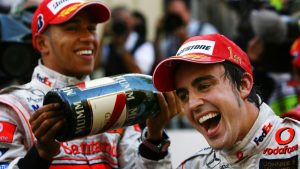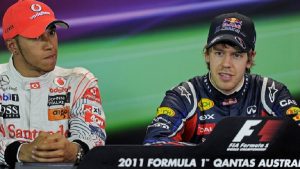Sky F1’s Mark Hughes on how Hamilton, Following a big transfer decision Involving Vettel’s dominance, has become F1’s driving force Lewis Hamilton’s world title comes 11 years after his initial, forming the arch of world championship victories in the game’s history.
It’s a telling tale and much more so when aligned with the two teams of the career, the McLaren years (2007-12) and people at Mercedes (2013-date).
Only one of his titles came in McLaren in his six seasons. The five have been won in his seven Mercedes years.
F1 2019: The top minutes
Hamilton & Rossi’s ultimate swap
There’s no question that the technical advantages he’s appreciated at Mercedes at the hybrid of F1 have been the cornerstone of the spectacular career figures.
By comparison, he appreciated McLarens that ranged from good (2007-08) through weak (2009) to fairly competitive but behind the very edge represented by Red Bull (2010-12).
Nevertheless, in his McLaren years, he had been hailed as’F1 driver’ even though was a split opinion on whether he was’the best’.
Those making the case he was the speediest would ordinarily cite Fernando Alonso as the very complete.
Yet it was Hamilton speed as a rookie team-mate of Alonso’s that played a key role with McLaren time.
That breakdown was something that Alonso’s career never recovered .
His reaction to were broken promises of team priority made his career less good than it might have been, putting him at a succession of places that were wrong at the wrong times.
In minding his key rival’s challenge through much of his career, hamilton’s astonishing form within his first F1 season played its role.
After clinching that last-gasp 2008 title (having narrowly missed out on becoming the first rookie winner in the sport’s history the year earlier ) and being calmed by the initially hopeless 2009 McLaren, Hamilton’s next four seasons were spent shooting opportunistic advantage of the rare days that Sebastian Vettel was not in dominant type in Adrian Newey’s Red Bulls.
During these four seasons (2010-13) of Red Bull domination, Hamilton won just as many races as he took in 2019 alone and it seemed feasible that Hamilton’s career stats never would rather match his recognized stature within the sport.
Hamilton’s era’s mathematically dominant driver looked defined as Vettel, a scenario that Hamilton at times seemed almost resigned .
But at the end of 2012, he made an off-track move more dramatic as he left McLaren to the hitherto Mercedes group, where he replaced Michael Schumacher whose comeback had fallen short of 44,, than the ones he was making on-track.
Though Hamilton won only 1 race in 2013, it was the that was the significant focus of its investment and the group – and has been the foundation of his blockbusting victory since.
As the driver in the car, the sport has surrendered itself , only a couple of mechanical issues in 2016 keeping him by a clean sweep of of the hybrid titles.
He now comfortably leads Vettel in his challenges going forward look set to be coming from the new generation and the documents of achievement, as personified by Max Verstappen and Charles Leclerc, men 12-13 years his junior.


